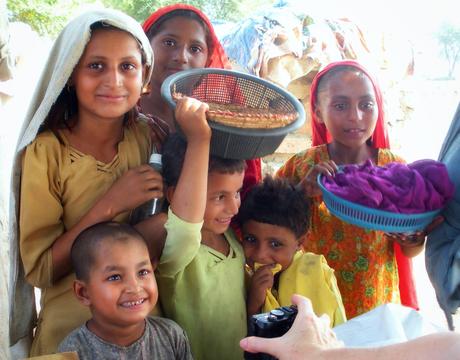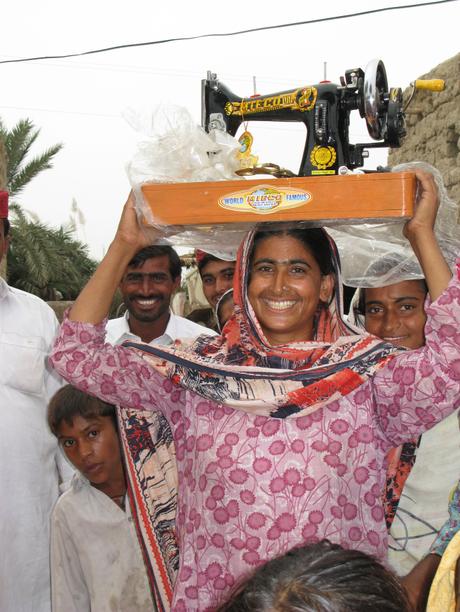
It was 10 years ago today that my sister-in-law and I arrived in Pakistan to participate in a 2-week medical relief trip.
At the end of the summer of 2010, Pakistan had been overwhelmed by floods with millions displaced. Camps for those who had lost their homes were set up across the country and aid was coming in from many countries around the world. Anytime there is a disaster like these floods, there is a domino effect of problems. Malaria, severe malnutrition, dysentery from poor water supplies, and skin diseases that happen when you have thousands of people living in close proximity to each other.
As my childhood home and love, Pakistan has a special place in my heart and to go back in this capacity was a gift. I returned with far more than I gave. What I didn't know at the time is that it would change the trajectory of my life, for it was during and soon after that trip that I began to write.
I began writing about childhood memories and belonging, about the trip to Pakistan and what it meant to me. I wrote about saudade and identity, about faith and being an adult third culture kid. I wrote and I wrote and I wrote. Soon after, I began a blog. The blog propelled me into writing a book, and then another book that I had begun several years earlier. Writing was my therapy, my way to make sense of so much that had happened long ago.
At the end of my trip, I wrote an essay called "Holy Moments from an Unholy Disaster." It was later published in my first book, but as I remember the anniverary of that return, I wanted to post it here.
To you who have read my words, who have encouraged me in my writing journey, who have stuck with me through mixed metaphors and my sometimes grammatically dubious sentence structure - I am beyond grateful. You have made my words live by reading them and posting them, by emailing or messaging me to say that my words resonate. I am so thankful.
On this 10 year anniversary of my return, here is the essay "Holy Moments from an Unholy Disaster."
Given the choice of a five-star hotel or camping, I will pick a five-star hotel every time. I tell friends that anyone who grew up in the developing world with a commode for a toilet and one bath a week would appreciate my love of luxury. So it was with some surprise that I found myself eager to return to Pakistan on a medical flood relief team.
When I first heard news of the floods, I felt a sadness that was somewhat distant and removed. Pakistan was my childhood love and home, but as an adult I have been more connected to the Middle East through work and travel. My connections with Pakistan had been reduced to occasional emails from friends and to moments on the subway when, eyes closed, the rhythmic movement transports me back to the Pakistani trains of my childhood. That changed when I saw a picture in the New York Times of the city of Jacobabad under floodwaters.
Jacobabad, in the Sindh province, was home to my family when I was a little girl. I broke my leg there. My mother's artificial flowers were stolen in Jacobabad. Mom had planted them around our house to add color to clay that would never grow anything. They provided a source of joy for a few hours and then they were gone. The New York Times photograph hit my heart in a way I had not anticipated, and through what could only be a work of God, an opportunity came about for me to participate as a nurse on a medical relief trip to care for internally displaced people in northern Sindh.
I never imagined that my life for a short time would resemble a National Geographic feature story. Although I grew up in Pakistan, raised my family in Islamabad, and lived for seven years in Cairo, my current reality is downtown Boston, where I drink a Starbucks coffee daily. I shop at Ann Taylor and get frustrated when my hot water runs out or I don't have time to put on my eyeliner. But in early September the idea of working with victims of the flood suddenly became real and I became cautiously excited, knowing I may not have what it would take but willing to take that chance.
On October fifteenth, accompanied by my sister-in-law, Carol, and thirteen thousand dollars worth of donated medical supplies, I boarded an Etihad airliner and flew via Abu Dhabi to Karachi ending the journey in Shikarpur, Sindh. Outside the Shikarpur gates, a kilometer from the hospital where we were based we passed the burnt remains of a convoy of twenty-seven trucks that had been featured in the New York Times "Pictures of the Day," and I realized that I hadn't paid as close attention to the location of that picture as I perhaps should have.

The two weeks that followed were filled with holy moments. I watched as a mom pointed to heaven in thanks for food distributed to her family. I laughed with children at my own mistakes in Urdu and Sindhi. I prayed in the depths of my soul for the baby who looked like a skeleton at four months of age and for the emaciated mom who held that child with the love only a mother could have. I put shoes on the ulcerated feet of an ancient woman, countless stories written into the wrinkles on her face. We delivered a sewing machine to a widow who danced with it on her head. We saw and served people created in the image of God. These women and children in their beautiful, brightly colored clothing were "no mere mortals" and dear to the heart of God.
Our team - a doctor, two nurses, a community healthworker, interpreter and food distributors - were like a mini United Nations. We represented six people groups and six different languages, but we shared a unity in purpose and spirit that gave us efficiency, laughter and joy. In fourteen days we covered eight villages, surveying needs, running medical camps, and distributing food. Mud huts, tents provided by USAID, and charpais combined with chickens, roosters, water buffalo and cow dung completed the setting and tested our nostrils and stamina. But everyday provided a new adventure and new moments of awe.
There was, for me, an added bonus. Almost anyone who was raised in a country other than his or her passport country can relate with the immigrant experience. The sense of isolation, nontransferable skills, and being 'other' can creep up at the oddest of times and result in a deep loneliness and sometimes conflict with one's passport country. Our lives are lived between worlds.
But for those two weeks I was not other. I was home. I saw friends who knew me when I was young, received blessings from men who worked with my father and women who had deep friendships with my mother, walked through compounds to the embraces of old friends, and was woken yet again by the call to prayer. These were holy moments that I had not anticipated.
A wise friend once told me that there are times in our lives when we need to remember who we are. During those two weeks, I was given the gift of remembering who I was.
Since leaving Pakistan as a child, I, like many, had to redefine my faith. It has often been a painful process. I struggle with unanswerable questions about life and God. This trip back was a humbling reminder that the God who sustained me when I was six years old at boarding school, crying into my pillow, is a God who still provides holy moments in places where real life happens.
I arrived back in JFK International Airport in New York City after twenty-three hours of travel and within a few minutes felt 'other' again. I faced a moment of confusion as I looked at the Immigration line options. Was I really a resident alien? An alien? No. I was a US citizen, shaped by cultures and moments that were not of my own making. In that moment I recognized that the peace of belonging happens deep in my soul and that peace can transcend the outside circumstances.
I don't know why I was given the gift of going. That is a mystery to me. But I know it was Grace.

